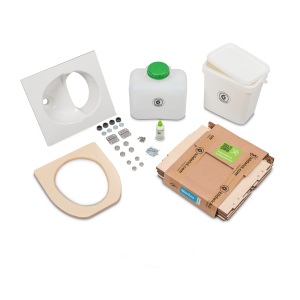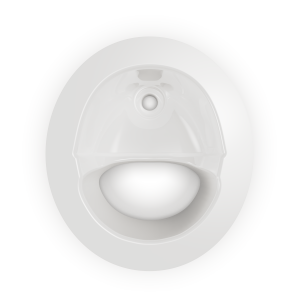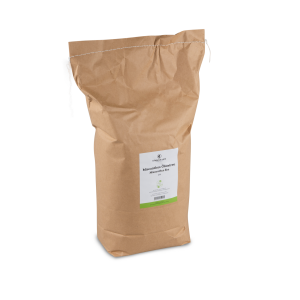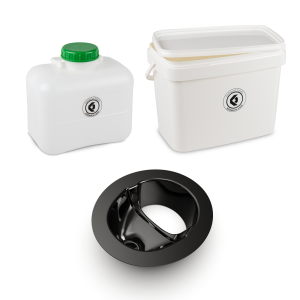Allotment Garden Wars
Who doesn’t know them from TV? The dubious shows with images of warring neighbors along a garden fence ... But that’s not what we want to write about in this article. Instead, this article is about the war between the public authorities and the many allotment gardeners in Germany regarding the problem of wastewater disposal.
According to the Federal Association of German Garden Friends e.V. (Bundesverband deutscher Gartenfreunde e.V.), there are five million garden allotments in Germany alone. Of course we can understand all of you garden lovers. After all, there is nothing more relaxing than watching your plants grow, tilling your garden beds after a hard week in the office, or enjoying an evening under the open sky with friendly people and cold drinks.
And this brings us to our topic: shortly after having a few drinks, a very natural need arises which has now become a big problem in many allotment gardens. Where does one go to take care of number 1 or number 2 if the lot is not connected to the local sewage system? The fact is that this is a real problem that many allotment garden associations have to deal with. At the request of the associations, municipalities and cities like to invoke the federal allotment garden law, which stipulates a wastewater-free management of gardens and cottages using simplified methods. So where to dispose of the so-called greywater, for example, when washing dishes or your hands?
In some garden areas there are communal sanitary facilities with toilets and washing facilities. But those are pretty rare. So some allotment gardeners have taken the situation into their own hands to find a solution: by grabbing a spade and digging a cesspit. Not a bad idea at first glance. However, uncontrolled sewage seepage puts an additional burden on groundwater systems. In some cases, the pits can also turn into the source of transmissible germs, so cesspits are now banned in Germany. Furthermore, constructing one is a criminal offense, a fact that many garden lovers are not aware of, since up to not too long ago nobody cared two hoots about them.
However, with increasing environmental pollution and a decrease in groundwater quality, this topic is becoming increasingly controversial. The authorities have begun checking more frequently in recent years and impose heavy fines. Depending on the charter of the allotment garden, both the tenant and the managing committee, if they had knowledge of any existing pits, can be held accountable. If you are thinking of leasing an allotment garden, inform yourself in advance about the sewage system and any cesspits that might have been installed by the predecessor. If you make a discovery, steer clear of the allotment and look for a more suitable property for your natural pursuits.
Some allotments have greener sewage pits - but exercise caution here as well. Informing yourself in advance is worth its weight in gold. Unfortunately, a lot of happy garden owners did not know in advance that even a legal sewage pit is not free of regulations and costs. Leakage checks are required regularly as well as requests for logs of proper disposal. Some allotment gardeners report high costs for pumping out the pits.
With all of these rules, regulations and costs you can almost lose your desire for gardening - but you don’t have to throw the towel into the compost heap just yet! Now that you've come to us looking for an uncomplicated solution to your garden toilet problem, we'd like to tell you more about what you can do with Kildwick's products and how easy our systems are to use.
Let’s take the DIY version of our EasyLoo as an example for your cottage.
Not too long ago, a keen gardener from Berlin called us to find out about the EasyLoo. Hermann told us that he likes to spend his weekends at the allotment with his wife. Inevitably, our conversation led to the topic of disposal issues in connection with dry-cleaning toilets. He was unsure whether the 9.5 liter urine tank and the 16.6 liter solid canister would last for a period of two to three days. We were able to calm his nerves regarding the canister size, as its volume is designed for more than a weekend. Since the two often also receive visits from their grandchildren, Hermann was sure that he would not get very far with the 9.5-liter capacity for urine. In this case we recommended that he buy a second Kildwick urine tank, as it is easier to just change them out when one tank is full.
Our passionate allotment gardener was excited about this solution and so an EasyLoo DIY kit with an additional urine tank were sent on their way to Berlin. Thank you for your trust Hermann!
Exactly five days ago the phone rang at Kildwick Headquarters – on the other end of the line our friend Hermann who wanted to order some more compostable Kildwick solids bags. This gave us the opportunity to ask him if he was satisfied with his new acquisitions. Assembling the toilet, he said, was self-explanatory and completed in short order. He and his wife are thrilled about the capacity and ease of disposal that this system offers them. One tank is enough for the two of them over the weekend. On Sunday, when they go back to their apartment, they take out the solids bag, knot it closed and dispose of the bag in the domestic household waste. The urine tank is screwed shut and disposed of in their home toilet and then washed clean. It’s now totally normal for him to pack the urine tank as well as the purchases for the weekend on Friday afternoon. Hermann and his wife are completely satisfied with their decision - and we were pleased to get such positive feedback from them.
A note from us:
We often mention that, under certain conditions, urine can be used as a liquid fertilizer in the garden and solids can be composted. Please note that every allotment garden club has its own unique regulations. It is always best to inform yourself in this regard by contacting the association board.









